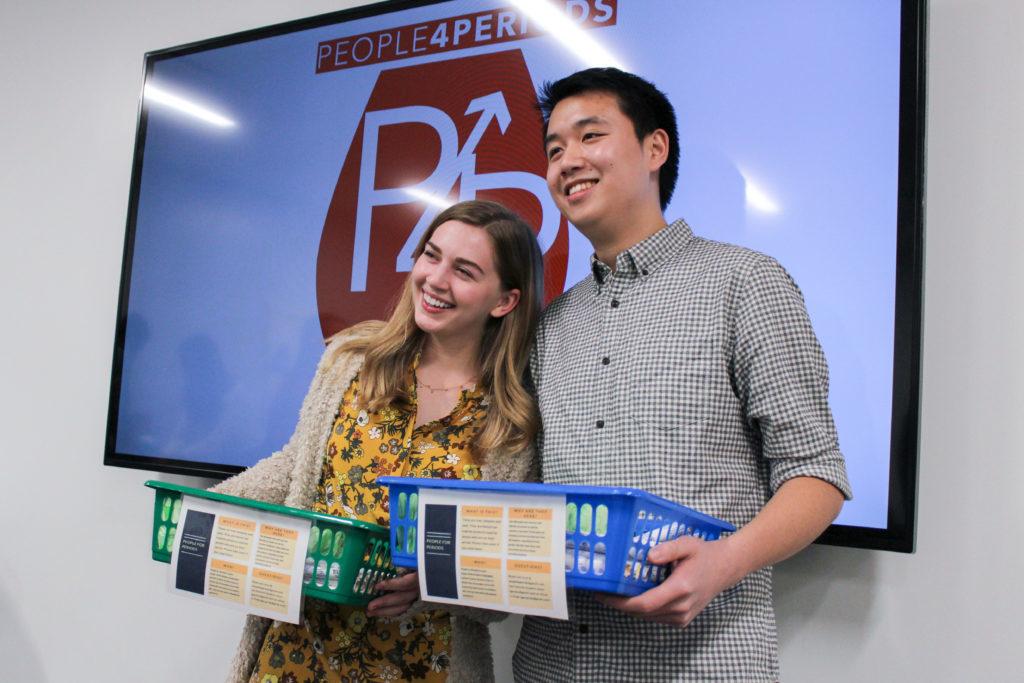Updated: Dec. 1, 2017 at 8:42 p.m.
After a year-long push from student groups, main campus buildings will now offer free tampons and pads.
Members of the Feminist Student Union, Student Association and The Store launched the People for Periods project Monday, stocking four sets of bathrooms across campus with free menstrual hygiene products. Leaders of the organizations said the project will help provide students with the resources they need to be comfortable in class and will start conversations on campus to destigmatize having a period.
Student leaders said the program will especially help lower-income students who struggle to pay for personal products like pads and tampons on top of other campus expenses.
Lauren Courtney, the president of FSU, said the project was the brainchild of multiple organizations working toward a common goal – free menstrual hygiene products – that has been in the making for more than a year. She said the effort began last year while she was the vice president for undergraduate student policy in the SA, where she and senators working on similar projects partnered to figure out how to make free pads and tampons a reality.
“The idea that if you have to leave class distracted because you don’t have tampons and pads, and you’re bleeding in the middle of class and you can’t pay attention – that’s not fair access to education,” she said.
Courtney said after FSU received funding from the SA finance committee for the project, she purchased more than $1,000 in pads and tampons – enough to stock four sets of restrooms with about 60 tampons and pads every other week through next semester.
The free products will be available in the basement of District House, the first floor of Gelman Library, the first floor of the Elliott School of International Affairs and the first floor of Milken Institute School of Public Health building.
The products are also stocked in men’s and gender neutral bathrooms because some people who have periods do not identify as female or use the women’s bathroom, Courtney said.
“We wanted this to be a gender-inclusive initiative to help destigmatize that people with vaginas have all sorts of gender identities, and that’s valid, and that’s something that we recognize as a community,” she said.
Courtney added a benefit to keeping the products in public buildings like District House ensure outside individuals, including homeless people or high school students, also have access to products they may need.
“We want to make sure that people in the community have access to these products because it’s definitely a sanitation issue that’s not always thought about when it comes to providing service to the community,” she said.
For a student heading to CVS at 2000 Pennsylvania Ave., a box of 36 tampons can run a $9 bill, and a package of 48 pads is about $15.
Volunteers, which are mainly being recruited from the SA, FSU and The Store, will restock the products every two weeks, she said.
SA President Peak Sen Chua said he also began working on the initiative as an SA senator last year for the public health school, where he saw a need for and an interest in free menstrual hygiene products.
“Their period shouldn’t prevent them from succeeding academically,” Chua said. “It shouldn’t prevent them from having the same opportunities as people who don’t menstruate.”
Sydney Eskin, a former SA senator who worked on the project last year as head of the SA academics committee, said People for Periods applied to be a student organization last spring, but the Center for Student Engagement rejected the application because officials thought the project would be better suited under another student organization, like FSU.
She said the group continued as a cluster of students who cared about the issue, and that this year will be a pilot period for the program, so that hopefully it can expand to other academic buildings and residence halls in the future. The group is still not an official student organization, but students will be tracking usage of the products over the course of the semester to adjust supply as needed and eventually present the CSE with enough research to become a student organization, Eskin said.
“GW should be setting the trend on things like that,” she said. “We are an amazing institution, and it’s not just about us. It’s about other schools being able to look to us as a trailblazer.”
University spokesman Tim Pierce said the University supports the People for Periods initiative and administrators began working on students with the project last spring.
“As part of our ongoing collaboration with student leaders, we have continued that dialogue since that time so as to ensure staff awareness on this student-led initiative and address operational concerns, such as which buildings to include in the pilot program, placement of products, ensuring items are properly disposed of, etc.,” he said in an email.
Saru Duckworth, the vice president of The Store, GW’s student-run food pantry, said members of the organization have seen first-hand students struggling to afford menstrual hygiene products. Last academic year, The Store ran a menstrual hygiene product drive to stock the pantry’s shelves – and Duckworth said the products went quickly, proving that there is a need for the items on campus.
“I think it’s great to see really passionate student orgs coming together over an important cause like this, and I think it’s a powerful idea that we can actually provide students with resources that students recently had to struggle with to obtain,” she said.
Lillian Bautista, Leah Potter, Sarah Roach and Meredith Roaten contributed reporting.
This post was updated to reflect the following correction:
The Hatchet incorrectly referred to Gelman Library as a public building. Only students, faculty, staff and select members of the surrounding community can access the library. We regret this error.




